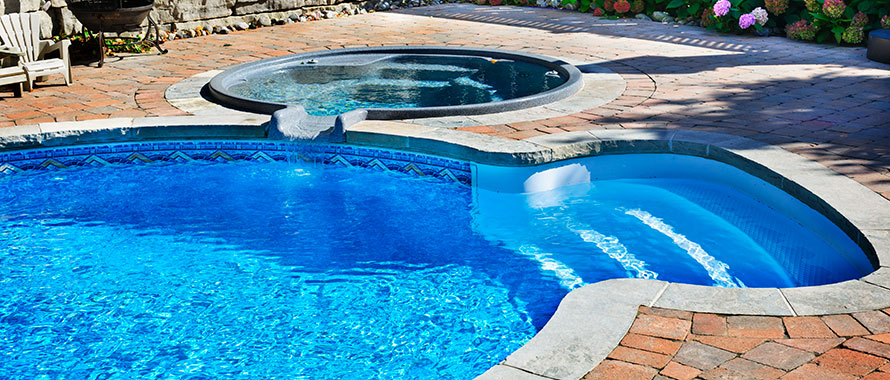An increasing number of homeowners are renting out their backyard pools to earn extra cash, the Wall Street Journal recently reported. At least 13,000 pool owners in the U.S. have signed up to rent out their pools by the hour through Swimply, an online platform that launched in 2020, while others are offering their swimming pools for rent on a daily basis through sites like Airbnb, VRBO and online marketplace Peerspace. On average, pool owners on Swimply reportedly bring in between $5,000 to $10,000 in pool rental fees each month.
The so-called “Airbnb for pools” trend grew significantly during the pandemic, according to reports, providing an income opportunity for pool owners and a chance for families to swim while many recreation facilities were closed due to COVID-19 restrictions. In Canada, one user in the Toronto area told CTV News in June that renting out her in-ground pool has more than paid for its maintenance costs and has provided a source of enjoyment for herself and local residents. Pools are only one short-term rental opportunity for homeowners: the soon-to-be-launched Joyspace app will help homeowners rent out their basketball courts, hot tubs, docked boats and more.
Despite the fun and revenue stream, these short-term rentals are a minefield of potential liability, said Wendy McCormack, Senior Underwriter, Personal Insurance, Burns & Wilcox, Toronto, Ontario.
“It is a huge liability hazard,” McCormack said. “The owner may not be there supervising, and they will not know what precautions the swimmers are taking. They could drown, get hurt, and it all will fall back on the homeowner’s liability.”

While Homeowners Insurance would usually cover a home, its contents, and liability for third-party injuries on the property, claims related to the rental use of a pool are likely to be excluded in many policies
While Homeowners Insurance would usually cover a home, its contents, and liability for third-party injuries on the property, claims related to the rental use of a pool are likely to be excluded in many policies, said Michelle Allemang, Manager, Personal Insurance, Burns & Wilcox, Chicago, Illinois.
“Business activities in general are typically excluded from a Homeowners Insurance policy form,” Allemang said. “It could be very risky to get involved with this, and I would caution homeowners to check with their insurance agent first to see whether they would have any coverage.”
Pool owners could be liable for drownings, slip-and-falls
Swimply’s growth has made multiple headlines in recent weeks, with news outlets covering the app’s success in places from Las Vegas, Nevada, to Windsor-Essex, Canada.1,2 The platform, which operates in the U.S., Canada and Australia, explains on its website that it has a protection guarantee that will “make things right” in the event of a guest injury or property damage.3 Swimply also notes that it offers up to $1 million in liability insurance and $10,000 in property damage protection.
Still, homeowners renting out their backyard pool should closely read the documentation for this type of coverage and consider whether $1 million is a high enough liability limit. “That limit can be eaten through pretty quickly,” Allemang said. “You would also want to look into the actual language of their policy to find out how the coverage would respond in different scenarios. Any intricacies to the coverage will be very important for homeowners to understand.”
Drownings account for approximately 3,960 deaths in the U.S. and over 400 deaths in Canada each year.4,5 In May of 2020, a 3-year-old girl died after being pulled from a pool at an Airbnb her family was renting in Glendale, Arizona.6 Nonfatal drownings are even more common and can cause long-term health problems, the U.S. Centers for Disease Control and Prevention reports. Accidents are also possible outside of the water, McCormack pointed out.
“A pool deck is slippery and there could be slip-and-falls, or someone could trip over pool equipment,” she said. “The likelihood of something happening is high.”
Those on the opposite end of the transaction should also be cautious, she added. “If they are paying to rent the pool, they need to make sure the owners are covered for renting that in case they are hurt,” McCormack said.
Although liability for injuries presents the greatest risk, property damage should also be considered. If the owner allows parties to take place at their pool, there is the potential for damage to expensive pool equipment, landscaping, grills, fencing, or bathrooms, for example.
“There are property damage related concerns as well,” Allemang said. “It is important to know who is renting and for what purpose, and I would recommend that owners stay on site to maintain some control over the property.”
Allemang said it is very important to know the age and usage intent of renters – for instance, a large pool party with alcohol consumption may lead to an increased risk in accidents, she said.
“Knowing the age and usage intent of renters is important to fully assess the scope of related risks and liability concerns,” she said. “Alcohol consumption by renters could also result in increased liability concerns for the homeowner.”
Other short-term rentals, such as offering up a boat or hot tub, would be similarly risky and have a high possibility of being excluded from a standard Homeowners Insurance policy. “With a pool or a boat, the owner is responsible for it,” McCormack said. “Most insurance companies are not too keen on renting out these things because of the liability hazard.”
Homeowners at risk for uninsured losses as demand soars for rental properties
Demand for private vacation rental properties soared during the pandemic and has continued as travel activity picks up speed.7 Following that trend, there has been an increase in American homeowners with vacation properties seeking out an amendatory endorsement for rented properties to their Homeowners Insurance, Allemang said.
“Essentially, it redefines some of the policy language to say that rental activities are not excluded based on the business operations exclusion,” Allemang said. “However, I have not seen this type of endorsement available for pool-only rental risks and since insurance markets already underwrite heavily for pool exposures in general, I find it unlikely that homeowner carriers will take on this risk because pools are known to have some very serious accidents.”
The same is true in Canada, where those who own Airbnbs or other vacation properties for rent are usually covered by Rented Dwelling Insurance, McCormack said. This coverage is in addition to Homeowners Insurance and can specifically cover the premises and certain limited perils, but coverage for a pool-only rental is unlikely.
“We are getting a lot of requests coming in where individuals are renting out their cottages. They see it as a source of income when they are not using the property,” she said. “Because of the high liability hazard and the risk that someone could get hurt, and without any controls in place for safety, there may not be many insurance companies that want to take that on.”
Given the high probability of pool-only rentals being excluded from Homeowners Insurance and rental-specific coverages, homeowners taking on this risk could be left to pay for injury-related lawsuits or property damage out of pocket.
“It would fall under the determination of the claims department on whether or not their personal liability would cover it,” McCormack explained. “Was the insurance company aware that the pool was being rented out? It could be considered a business exposure, and homeowners could financially be on the hook for the claim itself.”
Lawsuits over pool injuries, including fatal and nonfatal drownings, can be exceedingly expensive, Allemang pointed out. “For anything causing bodily injury, the payouts can be very significant,” she said. “Settlements can be in the millions of dollars, easily, especially if there is any long-term health impact. We are the most litigious country in the world. If your own insurance is not going to respond and does not want to take on this risk, you could end up in a really tough spot.”
Broker can help guide pool owners, others looking to rent property
Even if a pool owner’s Homeowners Insurance or rental endorsement does cover expenses related to a pool-sharing incident, future insurability should be taken into consideration. “They could have their policy canceled when the renewal comes up,” McCormack said, adding that finding insurance elsewhere could be a challenge.
While homeowners in the U.S. and Canada often have $1 million to $2 million in Homeowners Insurance liability limits, pool owners may also want to consider Excess Liability Insurance to increase those limits. “This can help cover the increased risk for the pool,” McCormack said. “That way, they have a higher limit available in the event of any losses.”

It is very important to have an early conversation with their insurance broker so that if it is excluded, they can determine if there is an alternative solution
Homeowners considering renting out their property — from an hourly pool rental to a single room or the entire house — should remember to speak with their insurance broker before making any plans or taking any reservations. “It is very important to have an early conversation with their insurance broker so that if it is excluded, they can determine if there is an alternative solution,” Allemang said.
McCormack agreed: “You should always call your broker immediately and tell them what you are thinking of doing. Find out if there is even coverage available.”
In addition to finding insurance coverage, homeowners should have strong safety precautions in place, such as staying on the property during rentals, limiting the number of swimmers and screening guests. “They need to screen their clients to make sure the home is not destroyed and that it is taken care of,” McCormack said.
Whether it is a backyard pool, a tennis court or another space that could be shared, homeowners will ultimately need to weigh the potential rewards against the many risks that can come with the rising use of shared property.8
“The sharing economy has really taken off in many aspects,” Allemang said. “It is an interesting way for individuals to make some money, which is attractive to a lot of homeowners, but from an insurance standpoint it definitely has significant implications.”
Sources 1Saha, Victoria; and Wright, Lucas. “Backyard pool sharing trend grows in Las Vegas thanks to ‘Swimply’ website.” KLAS, July 16, 2021. 2Thomson, Rusty. “Backyard pool rentals on the rise in Canada.” AM800, July 8, 2021. 3Swimply. “Does Swimply offer host liability insurance or protection if my property is damaged?” Swimply, July 2021. 4Centers for Disease Control and Prevention. “Drowning Facts.” CDC, June 17, 2021. 5Lifesaving Society. “Drowning Report.” The Drowning Prevention Research Centre, 2020. 6FOX 10 Phoenix. “3-year-old girl dies at hospital after being pulled from pool in Glendale.” Fox 10 Phoenix, May 23, 2020. 7Sebastian, Dave. “Airbnb, Vrbo Battle for More Vacation Cabins as Travel Rebounds.” The Wall Street Journal, June 17, 2021. 8Hoffower, Hillary. “The pandemic has led to a boom in services and spaces you can rent by the hour, and it's changing the sharing economy in the most surprising of times.” Business Insider, July 29, 2020.





